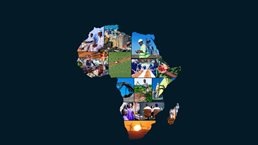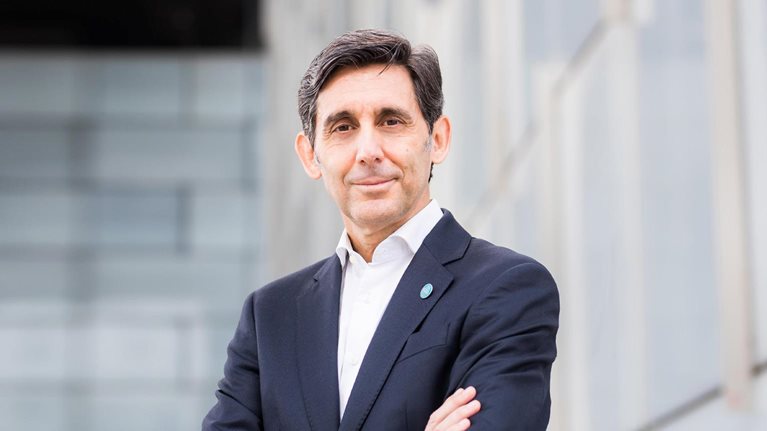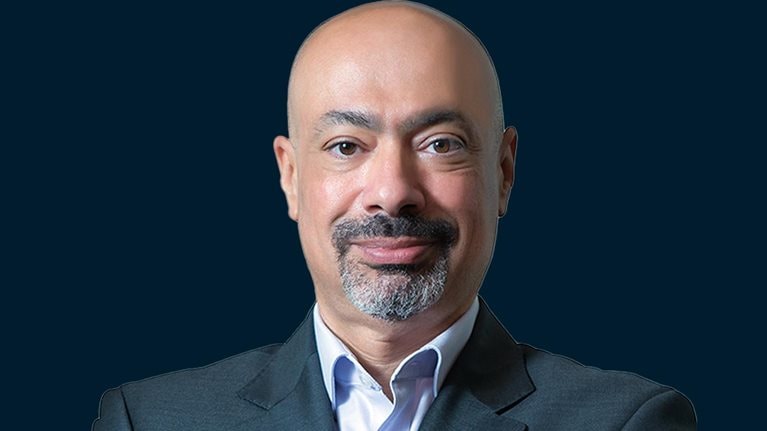This is the latest installment of Winning through Turns, a McKinsey series of interviews with telecommunications leaders. The previous installments can be found here, here, and here.
As president and CEO of MTN Group, Africa’s largest wireless telecom provider, Ralph Mupita is all too aware of the connectivity gap the continent faces and the negative effects it has on development and growth. But unlike many other observers, Mupita views the relatively low rates of smartphone penetration and broadband access as a significant opportunity to drive digital inclusion that will underpin the socio-economic development of the continent. In his mind, new investments in digital infrastructure will enable the continent to “leapfrog” its current hurdles and make seismic advances in everything from education to healthcare to agriculture, logistics, mining, and other industries. “At MTN we deeply believe that everybody deserves the benefits of a modern connected life,” Mupita said in a recent interview with McKinsey senior partners Wajih Abou-Zahr and Acha Leke, and associate partner Mandisa Mazibuko. In the wide-ranging discussion, Mupita spoke about such topics as industry regulation and consolidation, MTN Group’s new operating model, the war for talent, and his own affinity for wearing traditional African garb. The edited conversation appears below.
What digital infrastructure can do for development in Africa
McKinsey: How do you view the future of the telecom industry in Africa?
Ralph Mupita: I am generally very optimistic about the industry’s role and impact in Africa for several reasons.
First, we are still in the early stages of digital adoption and financial inclusion here, so there is much room for growth. Only about 50 percent of our customers use smartphones, for instance, and some don’t use data services. As for financial inclusion, the majority of the population doesn’t have access to financial services. Fintech providers have made real progress, as has our mobile money business, one of the biggest on the continent, but the work to deliver a decent suite of financial services solutions is at an early stage of development.
The other thing that fuels my optimism is the youthfulness of the African population, whose median age is 19. Considering the global workforce structure over the next 20 to 30 years, a sizeable share of the skilled tech workers we need will come from this continent.
McKinsey: Africa has faced some real challenges in recent years. In what ways can telecom and tech help to overcome some of them?
Ralph Mupita: Yes, the last two to three years have been especially tough, with the aftershocks of COVID-19, the war in Ukraine, and resulting inflation having a disproportionate impact on Africa. But I see enormous potential for Africans to leapfrog the current hurdles and emerge stronger and more determined to meet the aspirations of sustainable and inclusive social and economic development laid out in the Africa 2063 Agenda. Digital infrastructure services and related technologies have a significant role in achieving those goals.
That means, first and foremost, ensuring everyone has broadband access. It is essential for driving up the quality of life. There should be no child in any rural village across the African continent who does not have access to, let’s say, quality educational content just because of their family’s or community’s plight and financial condition.
Digital infrastructure can also have a significant impact on health and health outcomes. Just think of the number of Africans who die because they’re poor and lack access to medical attention. E-health and telemedicine could change that.
Agriculture is another area that’s a no-brainer. Technology can help transform the yields and production that can come out of this continent. Some 70 percent of all arable land globally that’s not cultivated is on this continent. I also get excited about how 5G can improve critical areas like mining, ports, and logistics. In Africa, the industrial applications of 5G will arguably be more important than the consumer use cases such as streaming and gaming. How do we make mining safer and more productive with private networks, for example, or how do we change the skillsets we have in the industry? How can 5G help accelerate the growth of oil and manufacturing in Africa?
McKinsey: You mentioned the importance of expanding broadband access across Africa. What will it take to help make this a reality?
Ralph Mupita: Yes, the connectivity gap across Africa needs to be tackled in many ways. We believe that everybody deserves the benefits of a modern connected life.
The rolling out of terrestrial networks across Africa has progressed relatively well, but there’s still more work to be done. We’ve got to think about how that is complemented by the non-terrestrial networks, such as LEO-based satellite constellations, that are beginning to emerge. Fiberization of the network is also crucial and will require a massive investment. The shift from 4G to 5G creates this convergence of fixed and wireless, and to enable that, a massive network of fiber railroads will need to be laid across the continent to connect the Cape to Cairo.
The final point is the cost of handsets and services. Handsets are still relatively expensive for most Africans, which also creates challenges for delivering a decent return and investing with a long-term horizon. We believe that the inflection point will occur when everybody can afford to consume 10GB per month, on a smartphone priced at $20. At that price point, you will see another surge of growth. With that growth, and the infrastructure available, we can ensure that Africa does not get left behind in this technology transition.
Envisioning MTN’s delayered, platform-centric future
McKinsey: Tell us about Ambition 2025, your company’s new strategy and delayered operating model.
Ralph Mupita: So, part of the rationale for Ambition 2025 is to ensure that we are positioned to capture growth much faster. In this model, we are moving from being just a telecommunications company to being a set of interconnected technology platforms. Connectivity is in and of itself a platform, but that connectivity works quite well as an adjacency to our other platforms, such as fintech, digital services, or instant messaging application Ayoba. Each platform requires a different operating model, financial and capital structure, risk profile, talent requirements, and incentives and compensation structure. We structure each of these platforms so that it can move as quickly as possible to capture the opportunity without losing the benefit of being part of the broader group. These businesses will continue to move forward, but they will move forward at different speeds and with varying degrees of required agility. Structuring our businesses in this way and seeking strategic partnerships where it makes sense will make us nimbler as an organization and remain at the forefront of driving digital and financial inclusion.
We actually started the delayering many years ago when we carved out all towers. But the direction we’re going in now is to carve out our fintech business, and we’re looking at carving out fiber as well. These are trends that we think are really important to lean into, trends that will provide customers with better service and better enable us to monetize the current technology transformation and position us to be able to win in the future. So, we are very, very excited about delayering.
The second aspect of Ambition 2025 is really around simplifying the group. We are moving out of certain geographies, such as the Middle East to focus all our human and financial capital on opportunities in Africa. We are also simplifying the balance sheet, which will give us the ability to absorb shocks as well as the financial flexibility to take on growth opportunities as and when they come.
The final part is that an enormous amount of value is hidden within the company and not fully reflected in the share price. It is up to us to reveal this value to our capital providers.
McKinsey: To what extent will the state of regulation affect the success of this strategy as well as that of Africa’s broad technology-driven transformation?
Ralph Mupita: There is an urgent need for more harmonized and modern regulatory frameworks across Africa.
Regulation is a potential massive driver of the growth and transformation of the industry. The regulatory frameworks that we have had over the last 20 years have served us very well. They were designed in the transition era from voice to data, basically from 2G to 3G technology.
But these regulatory frameworks are not fit for the future, and without change will keep Africa behind as the rest of the world advances. They are based on a belief that you need four to five or even six-player markets when we see consolidation globally in many markets.
Just as important, current regulations are still framed from the perspective of wireless versus fixed. In reality, a convergence of these technologies is taking place and is moving much faster than the regulation.
And another aspect, which is a real issue on the African continent, is a lack of harmonization of regulatory frameworks as you move from country to country. So, how you approach spectrum acquisition in Country X and Country Y, which might even be neighbors, needs to be quite different. It’s very challenging for us as a multinational operator in 19 markets where the regulations differ from country to country.
Modernizing and evolving regulations is critical for creating a more attractive climate for global capital. Many estimates show that the continent needs $100 billion in capital investments to meet the goal of universal broadband by 2030, but what is being spent now is insufficient.

Reimagining economic growth in Africa: Turning diversity into opportunity
McKinsey: Why do you feel consolidation is bound to happen?
Ralph Mupita: At least in our markets, we believe consolidation is inevitable and necessary. Most markets still have four or more operators licensed to operate and provide full infrastructure and services to their customers. But given the capital required for all those operators to have their own infrastructure, spectrum and other assets, the profit pools to be generated in any one market and potential returns are just too small to support that many operators.
And if you look back at the last decade or so, the challenge for the industry, both globally and in Africa, has been delivering a return on invested capital that exceeds the cost of capital. So, we believe many markets with four or five players will move to three, and sometimes you might even move to two operators with the infrastructure and the services layer. And this could, in turn, create more scope for companies to focus on providing only digital services whilst leveraging the infrastructure of two or so fully integrated operators in a market.
As part of our strategy and vision for 2025, we’ve built an instant messaging app that’s now reached more than 20 million monthly active users. We still have a long way to go to meet our ambition of 100 million. But that 20 million milestone has been something we celebrated internally, and we are arranging our own portfolio of digital services, including music, video, and gaming, that we can offer our customers rather than just raw data.
McKinsey: Speaking of services, are there lessons the industry can learn from the last ten years to help create more success and value in the coming years?
Ralph Mupita: If you go back maybe ten, maybe even 15 years, the industry was financially in a very good place. Top-line growth was driving strong cash generation and returns, especially with the shift from 2G to 3G, and there was very little debt on balance sheets.
But from the time the iPhone came into existence, most, if not all, of the value went to the over-the-top (OTT) players, such as streaming services and instant messaging apps that used the digital infrastructure without contributing in any material way to the cost of that infrastructure. The lesson to be learned is that governments and regulators need to think about a different framework so that all participants in or beneficiaries of the digital infrastructure are paying their fair share toward digital investment and regulatory fees and taxes. Operators are bearing too big a burden on investment and fiscal contributions.
Meaning, value, and the war for talent
McKinsey: The telecom sector was long viewed as one of the top training grounds for talent, but the war for talent has gotten more challenging in recent years, especially with banks and finance, other tech companies, and OTTs all proving very attractive. How do you think operators can regain their position as a talent magnet, and how does Ambition 2025 help you get there?
Ralph Mupita: The war for talent is going to be an unrelenting one. Ensuring that we have the right people and that those people find meaning in their work when they come to MTN is our top priority as an executive team as we go through this transformation. Ambition 2025 creates a new, stronger foundation for attracting and retaining talent.
Take the fintech business that we are carving out, for example. It has its own staff and talent profile needed for success in the future. In the past, people who have worked in financial services might not have even considered working at MTN, a telecommunications provider. But now they don’t have to think about us only in that context. They can say, “Well, I’m interested in what’s happening with the fintech business. This business has scale, it’s creating exciting new products, and it’s expanding into new markets”.
As we move through different technology cycles, the skills we need to have in abundance are changing. Software development and engineering have become much more important in our company than just three or four years ago. The ability to use big data and AI to make decisions, run your network, and run your company will also be in greater demand.
McKinsey: You mentioned the importance of employees finding meaning in their jobs at your company. To what extent do ESG and issues like sustainability play a role in that sense of meaning?
Ralph Mupita: We operate in some of the most challenging markets on the continent. Our belief is that by driving digital and financial inclusion we are giving Africans opportunities, dignity, and hope. And the journey we’re going through is then ultimately really about being mission-driven, with people and culture as the most important drivers of success.
I often tell the teams that if we are honest with ourselves, much of what we’re doing is easy to copy, whether it’s the strategy or technology. But what makes MTN different, what is very difficult to replicate, is the people, culture, and the diversity and inclusion that we have within the company. It’s a group of deeply committed people who believe in the mission of the company, and I think that is a little bit of the edge that this all gives us.
One of the strategic pillars of Ambition 2025 is what we call creating shared value. And you know, we put ESG at the core in that regard. So, we’ve arranged ourselves to be quite programmatic around how we think about creating shared value and all the elements of it and managing it in such a way that we will meet our aspirations.
For example, on the environment, we’ve pushed very hard around our commitments to decarbonize our networks and our operation to meet the net zero goal by 2040 and material reduction of emissions by 2030.
We’ve also put much emphasis on lowering the cost to communicate, diversity and inclusion. On diversity and inclusion, we are focused on increasing female participation in the workforce and in leadership roles towards 50 percent. We are currently just on 40 percent workforce participation. We are also focused on dealing with gender pay parity.
In our core connectivity business, as we move from 3G to 4G in some markets and 4G to 5G in others, there’s a lot of potential to contribute to socio-economic development. I really get excited about the power of the industrial internet through 5G and what that will do to transform the African continent. And for people who have a similar passion, who are inspired by that vision of MTN playing a role in driving economic transformation, coming to MTN creates an exciting and long-term future.
Pushing boundaries, pacing yourself, and dressing for African success
McKinsey: What are some of your interests or hobbies outside of work, and how do they shape your thinking about your role at MTN?
Ralph Mupita: Formula One is a passion of mine. I try to get to go to a race at least once a year. Not always possible but I try! There’s a lot to learn from that sport around pushing boundaries, finding new realities, teamwork, and the role technology can play to drive performance.
At a different pace altogether, I used to run marathons. And the biggest lesson I’ve taken from that has been the importance of setting clear goals, self-awareness, and the discipline of putting in the mileage and pacing yourself to help achieve them. I think self-awareness and pacing are key attributes of great marathon runners, and those traits apply to business as well. If you are deeply self-aware, disciplined, and pace yourself well, you can get through many challenges, a lot of ups and downs, over time, even when you encounter the proverbial walls that every marathon runner will talk about–and these are some of the parallels I’ve experienced myself in business.
McKinsey: Finally, we almost always see you wearing traditional African attire in public engagements. What’s the story and inspiration behind that?
Ralph Mupita: Once in Lagos, a then-fellow board member, Tunde Falowiyo, introduced me to a talented tailor named Olajire. And from that moment on, I started to mostly wear beautiful, well-tailored clothing from African tailors and designers.
Part of it is the pride in being African and the fact that I can make a difference. And the other part is practical. Traditional clothing, our caftans, are much more suited for our markets than Western suits. But I dress like this outside of the African borders as well. I love expressing my Africanness and supporting our great artists and tailors across the continent.


